A likeable, relatable protagonist. It’s what every writer is taught that all books, comics, movies, and TV shows must have. But if Breaking Bad and the Hannibal Lecter novels by Thomas Harris have shown us anything, it’s that we don’t have to admire or even like awful characters to want to spend time with them.
What I mean by awful characters are those that, depending on how you look at them, could or would be a villain. The fact is, in a lot of modern books, many characters walk on the razor’s edge of being a good or a bad guy, popularly known as the so- called “anti-hero.” We’re charmed by the clever leads in Fritz Leiber’s Fafhrd and Gray Mouser books, but that doesn’t make them any less a pair of thieves, drunks, and swords for hire. John Constantine of Hellblazer fame tries not to be a world wrecker, but people around him keep dying. In fact, early on in his adventures, he (spoiler alert) walls up a friend alive to keep the evil spirit that’s possessed him from escaping. But John tries to be good and he’s always witty, so we let him slide. And let’s not forget Michael Moorcock’s gloomy Elric of Melnibone. Aligned with chaos gods, Elric pretty much can’t eat a sandwich without killing off someone, often someone he knows. But he’s an interesting, tragic character with a modicum of conscience, so we keep going back for more.
It’s often a mental game between a writers and readers. Writers edging into this area will let their characters think and do things that ordinary protagonists might not do, but it’s a balancing act. How much do the writers try to restrain their characters and how far off the leash can they let them run? Readers get to play a different game. They get to wonder how they would act in the situation these sometimes awful characters find themselves. How far would they go? How appalled will they let themselves be, but keep reading? And readers get to wonder if, at the end of the day, the awful character will learn something that will lead to redemption.
Here are five novels with fascinating protagonists that on no planet whatsoever would be called “good guys.”
Frank in The Wasp Factory
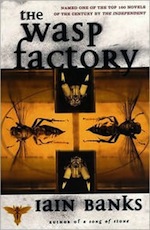 The Wasp Factory is the first book from novelist Iain Banks, best known for his Culture SF book series. The Wasp Factory is very different sort of book. The protagonist is Frank and Frank is something of a psychopath. But a strangely sympathetic one partly because he’s so open and pleasant about his gruesome obsessions, which include “sacrifice poles” sporting animal parts, plus the occasional murder. But it’s hard not to feel some sympathy for Frank because he’s surrounded by a family that in some ways is even crazier than he, especially his brother, Eric, who’s recently escaped from an asylum and is making his way home. The book is almost a parody of the kind of cozy pastoral novel in which we watch a callow youth grow into manhood. Frank does grow and change in the course of the story, but not in expected ways, and the climax of the book leaves him somewhere utterly new. Not redeemed so much as on the edge of a whole new life.
The Wasp Factory is the first book from novelist Iain Banks, best known for his Culture SF book series. The Wasp Factory is very different sort of book. The protagonist is Frank and Frank is something of a psychopath. But a strangely sympathetic one partly because he’s so open and pleasant about his gruesome obsessions, which include “sacrifice poles” sporting animal parts, plus the occasional murder. But it’s hard not to feel some sympathy for Frank because he’s surrounded by a family that in some ways is even crazier than he, especially his brother, Eric, who’s recently escaped from an asylum and is making his way home. The book is almost a parody of the kind of cozy pastoral novel in which we watch a callow youth grow into manhood. Frank does grow and change in the course of the story, but not in expected ways, and the climax of the book leaves him somewhere utterly new. Not redeemed so much as on the edge of a whole new life.
The Narrator in Fight Club
 While Fight Club isn’t specifically a fantasy novel, its off-kilter worldview, created by the narrator’s inability to sleep, places it in a realm that’s not entirely our own world. Fight Club tells the story of an unnamed insomniac who, after a three sleepless weeks, begins attending disease support groups because other people’s suffering helps ease own. When the support groups lose their effectiveness, he runs into a mysterious, charismatic man named Tyler Durden. They create a secret underground fighting society together which is also a recruiting center for Tyler’s anarchist master plan to, basically, destroy all modern consumer-oriented society. The core of the book is the often strained relationship between the narrator and Tyler. It’s a tricky one because as the story proceeds, we discover that our innocent narrator isn’t nearly as innocent as he first appeared. Author Chuck Palahniuk uses dark satire to test our ability to empathize with a set of interesting, but truly screwed up characters.
While Fight Club isn’t specifically a fantasy novel, its off-kilter worldview, created by the narrator’s inability to sleep, places it in a realm that’s not entirely our own world. Fight Club tells the story of an unnamed insomniac who, after a three sleepless weeks, begins attending disease support groups because other people’s suffering helps ease own. When the support groups lose their effectiveness, he runs into a mysterious, charismatic man named Tyler Durden. They create a secret underground fighting society together which is also a recruiting center for Tyler’s anarchist master plan to, basically, destroy all modern consumer-oriented society. The core of the book is the often strained relationship between the narrator and Tyler. It’s a tricky one because as the story proceeds, we discover that our innocent narrator isn’t nearly as innocent as he first appeared. Author Chuck Palahniuk uses dark satire to test our ability to empathize with a set of interesting, but truly screwed up characters.
Alex in A Clockwork Orange
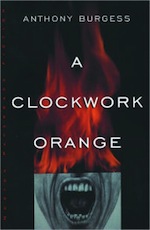 During WWII, author Anthony Burgess’s wife was robbed and raped by a group of US Army deserters. A Clockwork Orange is Burgess trying to understand who those young attackers were, what would lead them to do what they did, and to see if he could find any redemption for them. The “hero” of A Clockwork Orange is Alex, an utterly amoral young man who spends his time with a close group of friends—“droogs” in the book’s futuristic slang—robbing, raping, and destroying anything that catches their eye. Alex is a happy go lucky monster until he’s arrested and undergoes an experiment in which it’s hoped he’ll be unable to act on his violent impulses. However, while Alex isn’t violent anymore, is he cured? Like Frank in The Wasp Factory, Alex is a charming killer, welcoming us into his world. And like Frank, Alex grows up. Burgess’s central question is can someone like Alex find any true redemption or is destined to remain a gleeful psychopath his whole life? In the end, only Alex can tell you.
During WWII, author Anthony Burgess’s wife was robbed and raped by a group of US Army deserters. A Clockwork Orange is Burgess trying to understand who those young attackers were, what would lead them to do what they did, and to see if he could find any redemption for them. The “hero” of A Clockwork Orange is Alex, an utterly amoral young man who spends his time with a close group of friends—“droogs” in the book’s futuristic slang—robbing, raping, and destroying anything that catches their eye. Alex is a happy go lucky monster until he’s arrested and undergoes an experiment in which it’s hoped he’ll be unable to act on his violent impulses. However, while Alex isn’t violent anymore, is he cured? Like Frank in The Wasp Factory, Alex is a charming killer, welcoming us into his world. And like Frank, Alex grows up. Burgess’s central question is can someone like Alex find any true redemption or is destined to remain a gleeful psychopath his whole life? In the end, only Alex can tell you.
Johannes Cabal in Johannes Cabal, the Necromancer
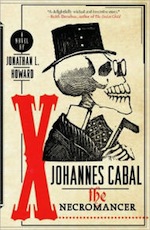 Johannes Cabal is a different kind of awful character than some of the others I’ve mentioned. Johannes isn’t a psychopath—he’s merely a bastard, in the best, funniest British sense of the word. Before the novel has even started, Johannes has sold his soul to the Devil, believing it will help him with his necromantic experiments. As the book opens, he’s trying to get his soul back, not because he’s repented, but because he realizes that he needs it to continue his work. As it turns out, the Devil is perfectly prepared to give Johannes back his soul—if he’ll deliver a hundred other souls to him in one year. Johannes agrees because basically, he enjoys his work and doesn’t like people very much. But he isn’t a true monster. He’s merely a bastard. And a hilarious one. It’s fun to watch Johannes break pretty much every code of civility he can, with humans and fiends alike. He’s helped along the way by a surrogate conscience, his brother Horst, who happens to be a vampire. Oh, and Horst’s condition is Johannes’s fault too. As far as monsters go, Johannes is small time, but when it comes to being a good old fashioned Awful Person, he’s solid gold.
Johannes Cabal is a different kind of awful character than some of the others I’ve mentioned. Johannes isn’t a psychopath—he’s merely a bastard, in the best, funniest British sense of the word. Before the novel has even started, Johannes has sold his soul to the Devil, believing it will help him with his necromantic experiments. As the book opens, he’s trying to get his soul back, not because he’s repented, but because he realizes that he needs it to continue his work. As it turns out, the Devil is perfectly prepared to give Johannes back his soul—if he’ll deliver a hundred other souls to him in one year. Johannes agrees because basically, he enjoys his work and doesn’t like people very much. But he isn’t a true monster. He’s merely a bastard. And a hilarious one. It’s fun to watch Johannes break pretty much every code of civility he can, with humans and fiends alike. He’s helped along the way by a surrogate conscience, his brother Horst, who happens to be a vampire. Oh, and Horst’s condition is Johannes’s fault too. As far as monsters go, Johannes is small time, but when it comes to being a good old fashioned Awful Person, he’s solid gold.
Judge Holden in Blood Meridian
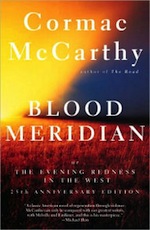 I’ve saved the biggest, most awful character for last. If there’s a truer monster than Holden in modern American literature, I don’t know who it is. The judge isn’t the protagonist of Cormac McCarthy’s novel, but he is unquestionably the central character. And while not technically fantasy, this surreal tale of mid-nineteenth century marauders and scalp hunters along the Mexican border takes place in as complex and richly self-contained world as anything conjured up by, for instance, Tolkien. You could describe Blood Meridian as a western, but by its language and imagery it’s a western written by a mad and vengeful Old Testament God. Over the course of the book, the judge murders, rapes, leads hideous raids on bands of Indians and towns, and collects scalps as trophies. Judge Holden is up there with Ahab in terms of obsession, but instead of a white whale, what the judge is seeking is horror itself. He is the personification of endless, mad violence. It’s hinted that the judge might not even be quite human. His strength is phenomenal. His appetites and knowledge are boundless. Near the end of the book we see him dancing in a saloon, “He dances in light and shadow and he is a great favorite. He never sleeps, the judge. He is dancing, dancing. He says that he will never die.”
I’ve saved the biggest, most awful character for last. If there’s a truer monster than Holden in modern American literature, I don’t know who it is. The judge isn’t the protagonist of Cormac McCarthy’s novel, but he is unquestionably the central character. And while not technically fantasy, this surreal tale of mid-nineteenth century marauders and scalp hunters along the Mexican border takes place in as complex and richly self-contained world as anything conjured up by, for instance, Tolkien. You could describe Blood Meridian as a western, but by its language and imagery it’s a western written by a mad and vengeful Old Testament God. Over the course of the book, the judge murders, rapes, leads hideous raids on bands of Indians and towns, and collects scalps as trophies. Judge Holden is up there with Ahab in terms of obsession, but instead of a white whale, what the judge is seeking is horror itself. He is the personification of endless, mad violence. It’s hinted that the judge might not even be quite human. His strength is phenomenal. His appetites and knowledge are boundless. Near the end of the book we see him dancing in a saloon, “He dances in light and shadow and he is a great favorite. He never sleeps, the judge. He is dancing, dancing. He says that he will never die.”
Richard Kadrey is a freelance writer living in San Francisco. He is the author of dozens of stories, plus ten novels, including the Sandman Slim series. The seventh novel in the series, Killing Pretty, is available now from HarperCollins.










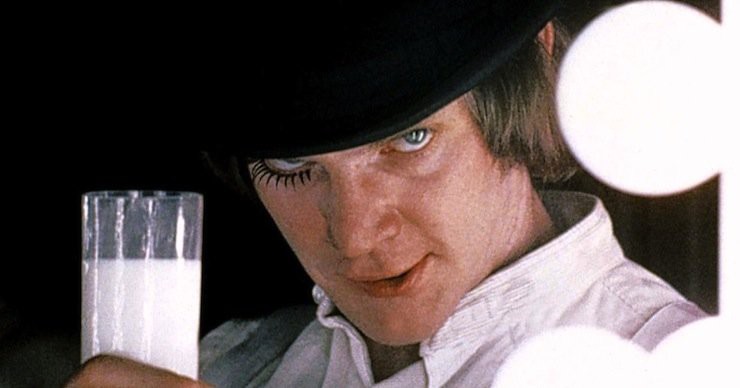
Joshua Quare, the protagonist of Kaleidoscope Century (by John Barnes) is a horrible person, who definitely belongs on this list (see this article for more http://www.tor.com/2010/02/23/nasty-but-brilliant-john-barnes-kaleidoscope-century/)
Mark Lawrence’s main character in the fantasy novel “Prince of Thorns” is based loosely on Alex from A Clockwork Orange. Something to check out if you like these books.
To step away from speculative fiction, there is Patricia Highsmith’s charming, talented and entirely amoral Tom Ripley.
I love these kinda stories, with bad protagonists. I always like novels where you have bad guys with their own code vs. bad guys with none.
Jorg from Mark Lawrence’s Broken Empire Trilogy immediately comes to my mind.
Marv from Frank Miller’s Sin City graphic novels, and movies is an all time favorite.
And Kane from the late Karl Edward Wagner’s novels and short stories is the ultimate revenge story. Based on Cain from the Bible – son of Adam and Eve, and brother to Able. Kane was cursed by God for rebelling against him. Kane is to a immortality of wander, never finding peace or rest until he dies by the violence that Kane introduced into the world. So makes it his goal to one day have revenge over God.
Every character in a Sara Douglass novel.
Thomas Covenant is a pretty terrible person. So is Nyx (from Kameron Hurley’s Bel Dame Apocrypha trilogy), although in a very, very different way.
The Chronicles of Thomas Covenant, of course…probably my introduction to books about horrible people.
Speaking of Donaldson – both of the space pirates in the Gap Series are pretty darned awful. Poor Morn Hyland, who is practically a meme about how badly one can be treated by both men.
What about Bruce Robertson from Irvine Welsh’s FILTH, truly horrible.
Morriel, the Prime Enchantress of the Koriathain in Janny Wurts’ War of Light and Shadows series is spectacularly evil.
Oh, and how about Anaander Mianaai of the Radchaai empire, in Ann Leckie’s Ancillary Justice/Sword?
Nyx, Nyx, Nyx is an excellent example.
Smaller role in the book, but Astrid Dane in VE Schwab’s A DARKER SHADE OF MAGIC.
When you get right down to it, Cugel the Clever (from Jack Vance’s Dying Earth books) is a) perhaps less clever than he might prefer to think and b) again, pretty much a terrible person in most regards.
Patrick Bateman from American Psycho has to be one of the worst I’ve read…
Oh, and also, one of my favorites (although not genre at all): Lolita. I had to stop reading the book for a few weeks because being inside the narrator’s head was just vile. But it’s a powerful story. (Spoiler alert: Lolita is not a precocious seductress).
Gully Foyle.
@8 That’s what I was going to say. By the end of The Gap Cycle, almost every character is an Awful, Awful Person, but none more so than Angus Thermopylae.
Arslan in the book of the same name. I’ve never seen a book with better reviews though I have seen better sales from worse books.
Pretty much every character in 100 Bullets, by Brian Azzarello, Eduardo Risso, and Trish Mulvihill. But especially Agent Graves.
Harry Flashman, in George Macdonald Fraser’s novels, whose self-admitted bullying, cowardice, poltroonery and appalling attitudes towards women and persons of color nevertheless make compelling reading.
How about the leads of 8 Bit Theatre.
“According to a loose enough definition of ‘hero’, we qualify. Well, more or less. The point is that good deeds were done and we were nearby.” – Red Mage
Definitely Jane, from Michael Swanwick’s The Iron Dragon’s Daughter, who is really a horrific protagonist who uses up every friend she ever has along the way.
Gerald Tarrant of the Coldfire Trilogy is pretty close to the edge as well – The Hunter is definitely a monster, but he is more than the monster. Or is he?
I’d also add Bauchelain and Korbal Broach from the Malazan series, one who makes being evil seem cool, and one who really really doesn’t. And the chaos and murder that always follows in their wake.
It’s not sci-fi or fantasy, but I’d say Bernie Gunther (Phillip Kerr’s Nazi era Berlin detective) is a pretty terrible guy.
All the examples I can think of are so-called “mainstream” or non-genre. Unlikeable– Sukhanov in Olga Grishin’s The Dream Life of Sukhanov. Or controversial– Hilary Mantel’s Thomas Cromwell. Or downright documented despicable– Nathan Bedford Forrest in Devil’s Dream by Madison Smartt Bell.
I can only conclude that I’ll put up with awful in the world I know. But if I’m going to be exploring new worlds and new civilizations, I want to do it in the company of people I like.
…oh, wait, I’ve got one: Lev Grossman’s Quentin Coldwater. But… I didn’t like those books nearly as much as I wanted to like them, so there it is.
@12: Cugel “the Clever” is an idiot and a f*ckup, which is what makes him amusing even though he’s horrible.
And @19: Flashy’s schtick is that the “moral”, “upright” people he encounters are worse than he is.
The Real Story by Stephen R. Donaldson. Angus Thermopyle. A real piece of trash character…and science fiction. I see it’s been mention in at least three posts here. That should tell reader something.
If you want a good fiction (though not a speculative one) with a disturbingly amoral character who’ll twist your entrails, read The Collector by John Fowles.
I remember the voice of that man getting under my skin – in a bad way – and the ending leaving me so distraught I had to take a week long break from reading as that novel kept poking back and disturbing me.
The Collector is a bad man who doesn’t feel like he’s doing anything that wrong, and the thickness of his mind will let you feel hopeless and curious but surely disgusted, like any jury in a cold murder case.
Harry Flashman indeed. If you have not read the Flashman novels you have missed out on one of the greatest literary characters ever created.
I never knew that about Burgess’ wife. Suddenly, ACO has a way different meaning.
The Seinfeld cast